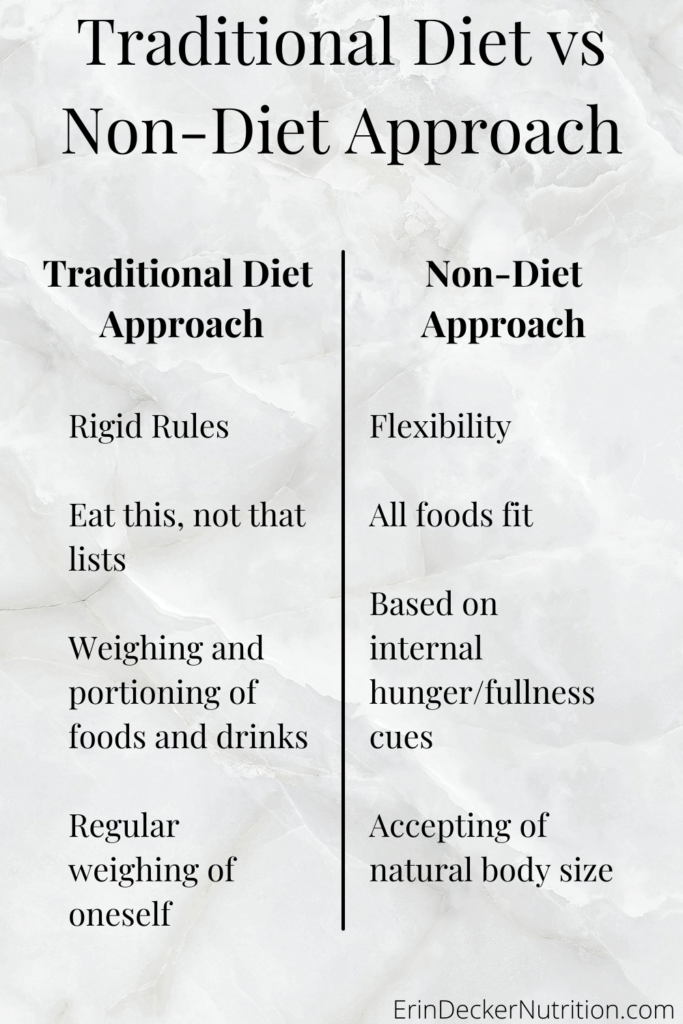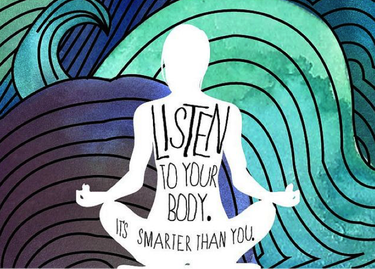What is the Non Diet Approach? Discover the Empowering Path to Health
The Non Diet Approach is a way of managing health that focuses on overall well-being and rejects traditional dieting methods. It promotes self-acceptance, intuitive eating, and body positivity.
In this approach, the emphasis is placed on listening to one’s body, honoring hunger and fullness cues, and developing a healthy relationship with food. It encourages individuals to focus on their overall health rather than solely on weight loss or appearance.
By adopting this approach, individuals can develop a healthier relationship with food and their bodies, leading to improved physical and mental well-being.

Credit: erindeckernutrition.com
Understanding The Non-diet Approach
The non-diet approach is a mindful and sustainable way of approaching health and well-being. Rather than focusing on strict dieting and weight loss, this approach emphasizes a holistic view of health that includes mental, emotional, and physical well-being.
Key Principles
- Health at Every Size: Embracing the idea that all body shapes and sizes should be respected and valued.
- Intuitive Eating: Encouraging individuals to listen to their body’s natural hunger and fullness cues.
- Self-Acceptance: Promoting self-love and body acceptance, regardless of size or shape.
- Rejecting Diet Culture: Challenging societal norms that prioritize thinness and promote harmful dieting practices.
Difference From Traditional Dieting
In contrast to traditional dieting, which often involves rigid meal plans, calorie counting, and strict rules, the non-diet approach focuses on developing a healthy relationship with food and body. Instead of viewing food as the enemy, individuals are encouraged to find joy in eating and nourishing their bodies based on internal cues.
Benefits Of Adopting The Non-diet Approach
A non-diet approach emphasizes intuitive eating over restrictive dieting, promoting a healthier relationship with food and body image. By shifting the focus from weight loss to overall well-being, individuals can experience a range of benefits:
Improved Relationship With Food
Emphasizes listening to body cues, fostering a positive relationship with food choices.
Enhanced Mental Well-being
Reduces stress associated with dieting, promotes self-acceptance and body positivity.
Fundamental Components Of The Non-diet Approach
The Non-Diet Approach is a revolutionary way of approaching health and wellness that focuses on self-care, body acceptance, and intuitive eating. This approach rejects the traditional concept of dieting and instead promotes a balanced and mindful relationship with food and your body. By understanding and embracing its fundamental components, you can experience a more positive and sustainable approach to health. The key components include intuitive eating and body acceptance.
Intuitive Eating
Intuitive eating is at the core of the Non-Diet Approach and encourages an intuitive and mindful approach to eating. It involves tuning in to your body’s signals of hunger and fullness and making food choices based on your individual needs and preferences.
This component encourages you to trust your body’s natural cues and signals rather than relying on external rules or restrictions. By honoring your hunger and fullness levels, you can establish a healthier relationship with food and develop a sense of trust and satisfaction in your eating habits.
Intuitive eating also emphasizes the importance of listening to your body’s cravings and desires without judgment. It encourages you to give yourself permission to enjoy all types of food, including those often labeled as “unhealthy” or “forbidden,” in moderation and without guilt.
Body Acceptance
Body acceptance is another crucial component of the Non-Diet Approach. It focuses on fostering a positive and compassionate relationship with your body, irrespective of its shape or size.
This component recognizes that every body is unique and that health is not determined by appearance alone. It emphasizes the importance of respecting and appreciating your body for all the amazing things it enables you to do.
Body acceptance encourages self-care practices that are not driven by the desire to change or control your body, but rather to nourish it and support its overall well-being. It promotes self-love, self-compassion, and a positive body image, allowing you to develop a healthier and more sustainable approach to your well-being.

Credit: dietitiansuccesscenter.com
Common Misconceptions About The Non-diet Approach
The Non-Diet Approach challenges the misconception that dieting is the only way to achieve health and wellness. It emphasizes intuitive eating, body acceptance, and rejecting the diet mentality, promoting a balanced and sustainable approach to food and fitness. By focusing on holistic well-being rather than weight loss, it encourages a healthier relationship with food and body image.
Equating Weight With Health
One common misconception about the Non-Diet Approach is the belief that weight is the sole indicator of a person’s health. Society has ingrained in us the idea that being thin equates to being healthy, and conversely, that being overweight automatically means being unhealthy. However, this oversimplification of the relationship between weight and health fails to take into account the complexity of individual differences and the multifaceted nature of well-being.
Rather than focusing solely on weight, the Non-Diet Approach emphasizes overall health and well-being, acknowledging that health is a combination of physical, mental, and emotional aspects. It recognizes that individuals can have diverse body shapes and sizes, and that health can be experienced at various weights.
According to research, many factors contribute to a person’s health, such as nutrient intake, physical activity levels, stress management, social connections, and access to healthcare. Thus, it is crucial to adopt a more holistic approach to health instead of assuming that weight is the primary determinant of one’s well-being.
Belief In Quick Fixes
Another misconception about the Non-Diet Approach is the view that it promotes a lack of accountability and encourages people to abandon all efforts towards self-improvement. This misconception often stems from a misunderstanding of the term “non-diet,” leading some to believe that it means giving up on healthy habits altogether.
Contrary to this belief, the Non-Diet Approach actually encourages individuals to engage in sustainable and nourishing behaviors, rather than relying on quick-fix solutions that yield temporary results. It promotes a shift towards intuitive eating, body acceptance, and self-care practices that support long-term well-being.
Quick-fix diets or weight loss programs often lead to yo-yo dieting, where individuals experience weight loss followed by weight regain, resulting in a detrimental cycle of weight fluctuations. In contrast, the Non-Diet Approach aims for a balanced and sustainable approach to health, free from the negative effects of dieting and constant weight obsession.
By implementing healthy lifestyle habits that align with an individual’s unique needs and preferences, the Non-Diet Approach fosters a positive relationship with food, body, and overall well-being. It emphasizes self-compassion, recognizing that true health and happiness come from nourishing the body and mind without depriving oneself or succumbing to unrealistic expectations.
Steps To Implement The Non-diet Approach
Implementing the Non-Diet Approach involves a shift in mindset and adopting a new way of thinking about food, body image, and overall well-being. By focusing on rejecting diet culture and building self-compassion, individuals can cultivate a healthy relationship with food and their bodies.
Rejecting Diet Culture
One of the first steps in implementing the Non-Diet Approach is rejecting diet culture. Diet culture promotes harmful beliefs around food restriction, weight loss, and body ideals. It instills the notion that our worth is tied to our appearance and encourages harmful practices.
To reject diet culture, it is essential to challenge and question societal norms and messages related to beauty standards. Recognize that health and happiness can be achieved at any size, and that weight is not an accurate measure of a person’s worth or well-being.
Building Self-compassion
Building self-compassion is another crucial step in implementing the Non-Diet Approach. Many individuals have spent years believing that they are not good enough or that their bodies are flawed. This negative self-talk and self-criticism can be detrimental to mental and emotional well-being.
To build self-compassion, start by practicing kindness, understanding, and forgiveness towards yourself. Accept that your body is unique and that it deserves love and respect, regardless of its size or shape. Focus on nurturing yourself with nourishing foods, enjoyable movement, and self-care practices that prioritize your overall well-being.
It’s important to remember that implementing the Non-Diet Approach is a personal journey that requires patience and self-reflection. By rejecting diet culture, building self-compassion, and embracing a holistic approach to health, individuals can break free from the constraints of diets and develop a healthier and more positive relationship with food and their bodies.

Credit: everglownutrition.com
Challenges And Criticisms Of The Non-diet Approach
Addressing Societal Norms
The Non-Diet Approach faces challenges in addressing societal norms that prioritize thinness over health.
Restrictive beauty standards perpetuate disordered eating habits and negative body image.
This approach aims to dismantle harmful beliefs and promote self-acceptance regardless of size.
Concerns About Health Outcomes
One criticism of the Non-Diet Approach is concerns about health outcomes of individuals.
Traditional diet culture often equates weight loss with improved health, while neglecting holistic well-being.
The Non-Diet Approach emphasizes intuitive eating and body positivity to prioritize sustainable health practices.
Success Stories Of Individuals Embracing The Non-diet Approach
Embracing the non-diet approach has led to remarkable success stories of individuals who have found true freedom and happiness by prioritizing their well-being above restrictive eating habits. Let’s delve into some inspiring personal transformations and the positive impact on overall well-being.
Personal Transformations
Sara, embraced the non-diet approach and experienced a life-changing transformation. Instead of focusing on numbers on a scale, she shifted her focus to honoring her body’s needs and intuitive eating. Through this approach, Sara reclaimed a healthy relationship with food and her body, leading to increased self-confidence and vitality.
Positive Impact On Overall Well-being
John is another individual who found immense joy and peace through the non-diet approach. By listening to his body’s cues and nourishing it with foods that made him feel energized, John noticed a significant improvement in his physical health and mental well-being. This approach helped him break free from the restrictions of traditional diets and led to a sustainable and positive lifestyle change.
Shifting The Paradigm: The Future Of Health And Wellness
Shifting the Paradigm: The Future of Health and Wellness
Embracing a non-diet approach is the new frontier in the realm of health and wellness. Instead of fixating on restrictive diets and unsustainable weight loss goals, this progressive approach focuses on embracing holistic health and promoting body diversity. By shifting the focus from weight-centric measures to overall well-being, the non-diet approach is revolutionizing the way we perceive health and self-care.
Focus On Holistic Health
Unlike traditional dieting methods that often prioritize weight loss over overall health, the non-diet approach places a strong emphasis on holistic health. It recognizes the interconnectedness of physical, mental, and emotional well-being, encouraging individuals to adopt sustainable lifestyle habits that nurture their entire being. This approach not only fosters a healthier relationship with food and exercise but also prioritizes mental wellness, stress management, and quality sleep as integral components of overall health.
Promotion Of Body Diversity
The non-diet approach celebrates body diversity and underscores the importance of embracing unique shapes, sizes, and abilities. By rejecting the one-size-fits-all mentality perpetuated by diet culture, this paradigm shift acknowledges that health and wellness look different for every individual. Instead of striving for a singular, idealized body type, the non-diet approach encourages acceptance, inclusivity, and respect for diverse bodies. It empowers individuals to focus on nourishment, movement, and well-being rather than adhering to unrealistic societal standards.
Conclusion
To sum up, the non-diet approach shifts focus from weight to overall well-being. Embracing intuitive eating and promoting body acceptance fosters a positive relationship with food and self. By incorporating mindfulness and self-compassion, individuals can cultivate sustainable, healthful habits. Ultimately, the non-diet approach offers a holistic approach to leading a balanced and fulfilling life.
